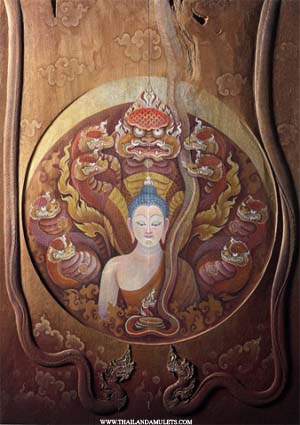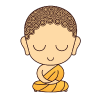Mongkon - The life of Buddha

In Todsachart Chadok, is the story of JaoChai Sintutta who's success dharma and become a religious prophet , the enlilighten one namely the Buddha. instead of himself he leave the Dharma which he's success the way to stop pain,trouble,sorrow etc to all buddhism. To success in dharma he's continue doing good deed and in last 10 life he's conduct 10 good deed which make him success Dharma in the life of Prince Sintutta (india).
In the sixth century before the Christian era, religion was forgotten in India. The lofty teachings of the Vedas were thrown into the background. There was much priestcraft everywhere. The insincere priests traded on religion. They duped the people in a variety of ways and amassed wealth for themselves. They were quite irreligious. In the name of religion, people followed in the footsteps of the cruel priests and performed meaningless rituals. They killed innocent dumb animals and did various sacrifices. The country was in dire need of a reformer of Buddha's type. At such a critical period, when there were cruelty, degeneration and unrighteousness everywhere, reformer Buddha was born to put down priestcraft and animal sacrifices, to save the people and disseminate the message of equality, unity and cosmic love everywhere.
Buddha's father was Suddhodana, king of the Sakhyas. Buddha's mother was named Maya. Buddha was born in B.C. 560 and died at the age of eighty in B.C. 480. The place of his birth was a grove known as Lumbini, near the city of Kapilavastu, at the foot of Mount Palpa in the Himalayan ranges within Nepal. This small city Kapilavastu stood on the bank of the little river Rohini, some hundred miles north-east of the city of Varnasi. As the time drew nigh for Buddha to enter the world, the gods themselves prepared the way before him with celestial portents and signs. Flowers bloomed and gentle rains fell, although out of season; heavenly music was heard, delicious scents filled the air. The body of the child bore at birth the thirty-two auspicious marks (Mahavyanjana) which indicated his future greatness, besides secondary marks (Anuvyanjana) in large numbers. Maya died seven days after her son's birth. The child was brought up by Maya's sister Mahaprajapati, who became its foster-mother.
On the birth of the child, Siddhartha, the astrologers predicted to its father Suddhodana: "The child, on attaining manhood, would become either a universal monarch (Chakravarti), or abandoning house and home, would assume the robe of a monk and become a Buddha, a perfectly enlightened soul, for the salvation of mankind". Then the king said: "What shall my son see to make him retire from the world ?". The astrologer replied: "Four signs". "What four ?" asked the king. "A decrepit old man, a diseased man, a dead man and a monk - these four will make the prince retire from the world" replied the astrologers
Suddhodana thought that he might lose his precious son and tried his level best to make him attached to earthly objects. He surrounded him with all kinds of luxury and indulgence, in order to retain his attachment for pleasures of the senses and prevent him front undertaking a vow of solitariness and poverty. He got him married and put him in a walled place with gardens, fountains, palaces, music, dances, etc. Countless charming young ladies attended on Siddhartha to make him cheerful and happy. In particular, the king wanted to keep away from Siddhartha the 'four signs' which would move him to enter into the ascetic life. "From this time on" said the king, "let no such persons be allowed to come near my son. It will never do for my son to become a Buddha. What I would wish to see is, my son exercising sovereign rule and authority over the four great continents and the two thousand attendant isles, and walking through the heavens surrounded by a retinue thirty-six leagues in circumference". And when he had so spoken, he placed guards for quarter of a league, in each of the four directions, in order that none of the four kinds of men might come within sight of his son. |



